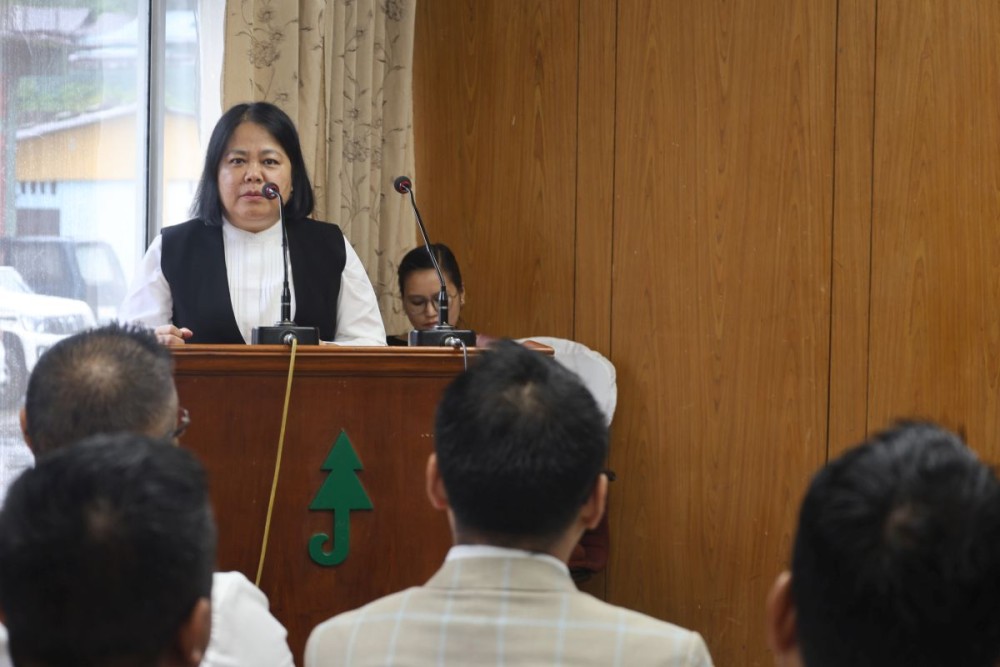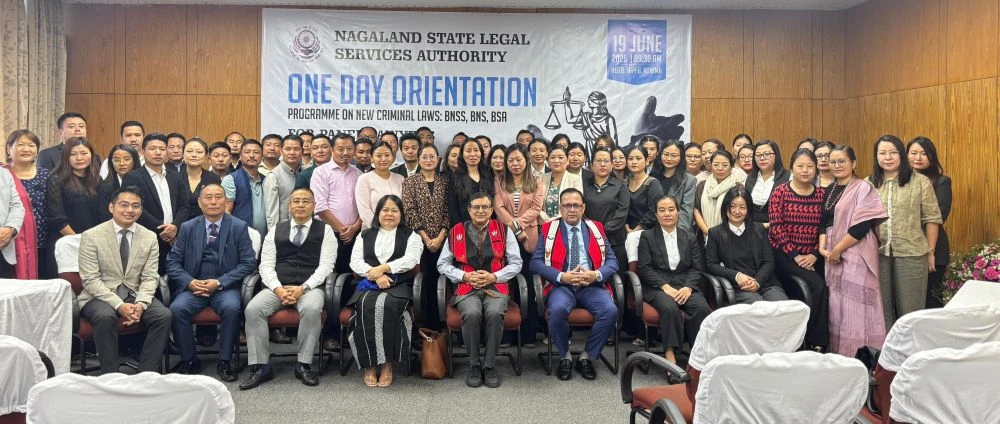Justice Yarenjungla Longkumer speaking during the event on June 19. (Photo Courtesy: NSLSA)

Kohima, June 19 (MExN): Gauhati High Court Judge, Kohima Bench, Justice Yarenjungla Longkumer has brought attention to the evolving role of panel lawyers as frontline defenders of justice for the marginalized, asserting their duty to also act as educators, advisors, and counsellors amid a major legal transition in India.
Addressing an orientation programme on the new criminal laws at Hotel Japfü in Kohima on June 19, Justice Longkumer said that the introduction of the Bharatiya Nyaya Sanhita (BNS), Bharatiya Nagarik Suraksha Sanhita (BNSS), and Bharatiya Sakshya Adhiniyam (BSA) signifies a transformative moment for India’s criminal justice system, replacing the Indian Penal Code, Criminal Procedure Code, and Indian Evidence Act.
“These new legislative reforms are not just mere cosmetic changes but represent a new way of thinking—how the justice system is perceived, delivered and experienced by the common citizens,” she stated.

The programme was organised by the Nagaland State Legal Services Authority (NSLSA) for retainer lawyers, panel lawyers and Legal Aid Defense Counsel System (LADCS) lawyers.
Justice Longkumer highlighted that panel lawyers are often the first point of access to justice for underrepresented communities and stressed their enhanced responsibility in light of the new laws. “You have to learn to adapt to changes with professionalism, and as with any legal transition, there will be challenges and uncertainties in interpretation,” she said.
Calling for deeper engagement with law and renewed commitment to justice, the judge acknowledged the practical challenges of transitioning to the new legal framework. “We now have to change our mindset, unlearn the IPC and CrPC, and learn the new laws,” she said. “But that is also an immense opportunity to refine our practice and lead with clarity so that justice becomes more sensible, humane, and aligned with constitutional values.”
Stressing that laws are constantly evolving, she added, “The lawyer’s duty to uphold justice remains timeless to protect the rights of every individual regardless of their background.”
Justice Longkumer urged participants to develop a strong grasp of the BNS, particularly its reclassification of offences, introduction of community service as a form of punishment, enhanced victim compensation under BNSS, and modernised evidentiary standards under the BSA, including digital evidence.
“This training is not just about reforms; it is about empowering lawyers,” she said. “Your clients cannot afford to be confused, and delay must be avoided.”
NSLSA Member Secretary Neiko Akami delivered the welcome address, stating that the training was aimed at equipping NSLSA lawyers to provide effective legal aid to diverse sections of society. The session was chaired by NSLSA Retainer Lawyer Apila Sangtam.
During the technical sessions, resource persons from Judicial Academy, Assam—Nasim Akhtar and SP Moitra—offered detailed overviews on the BNSS, BNS, and BSA. Topics covered included FIR procedures, investigation methods, digital and forensic evidence, changes in medical examination protocols, plea bargaining, trial in absentia, community service, victim compensation, witness protection, and reforms in bail and remand procedures.
Moitra also explained modifications and reorganizations in the Bharatiya Sakshya Adhiniyam, highlighting the transition from the Indian Evidence Act.






